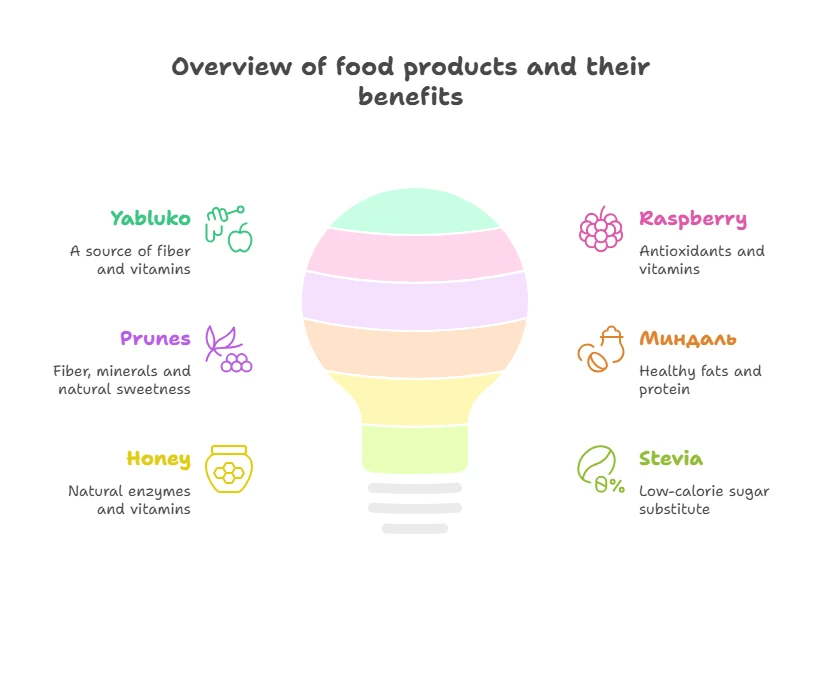

Most of us like to sit down with a cup of tea and something delicious for a snack.
However, traditional cakes, high-sugar cookies and creamy desserts often lead to an overabundance of calories, which can affect weight and overall health.
In this article, we’ll break down which foods are healthier, how to choose the right alternatives, and what scientific research supports this.

Why you should reconsider your tea drinking habits
Tea is a healthy beverage rich in antioxidants and biologically active substances [1]. However, if we constantly supplement it with sweets high in sugar and fat, all the benefits of tea can be negated.
- Calorie control
Excess calories from fast carbohydrates (the same sweets) is one of the main causes of weight gain and obesity [2]. - Stabilizing blood sugar levels
High blood sugar levels can provoke feelings of hunger, overeating and, as a result, excess weight gain [3]. - Overall health
A healthy diet helps maintain energy, improves mood and reduces the risk of developing a number of chronic diseases.

Useful alternatives to tea
Instead of calorie-laden cakes and chocolate bars, you can find lighter, yet tasty options that will not only give you pleasure, but also benefit your body.

Fruits and berries
- Apples, pears: rich in fiber, help keep you feeling full longer.
- Berries (raspberries, strawberries, blueberries): contain vitamins, antioxidants that help strengthen the immune system.
- Citrus fruits (oranges, grapefruit): good source of vitamin C.
Dried fruits and nuts
- Apricots, prunes: contain natural sugar, many minerals and fiber, but should be moderated due to their high caloric content.
- Almonds, walnuts: a valuable source of healthy fats and protein [4].
Natural sweeteners and desserts
- Honey: healthier than refined sugar, but also caloric, so moderation is key.
- Stevia: a plant-based, non-caloric sweetener, helps reduce overall sugar intake [5].
- Dark chocolate (70% or more cocoa): lower in sugar and high in antioxidants.
Below is a table with approximate calorie data and the main benefits of each product. Calorie values may vary slightly depending on the variety and cooking method.
| Product | Approximate calories (per 100 g) | Main benefit |
|---|---|---|
| Apple | 52 kcal | Source of fiber, vitamins |
| Raspberries | 52 kcal | Antioxidants, vitamins |
| Prunes | 240 kcal | Fiber, minerals, natural sweetness |
| Almonds | 576 kcal | Healthy fats, protein |
| Honey | ~300 kcal | Natural enzymes, vitamins |
| Stevia (powder) | 0 kcal | A non-caloric sugar substitute |

Peculiarities of selection and combination
To make the tea party comfortable and maximize its benefits, you should pay attention to:
-
Moderation
You should not get carried away even with healthy foods. For example, nuts and dried fruits are quite caloric, so the portion should be small. -
Combination of flavors
- Green tea is a good friend of citrus fruits and berries.
- Black tea is traditionally combined with apple and cinnamon.
- Herbal teas can be supplemented with a small amount of honey or stevia.
-
Product quality
It is advisable to choose organic fruits without added sugar syrups, as well as natural honey and quality chocolate.
Below is another small table with sample combinations of teas and healthy snacks.
| Type of tea | Recommended appetizer | Commentary |
|---|---|---|
| Green | Berries (raspberries, blueberries), citrus fruits | Refreshing combination, enhances antioxidant effect |
| Black | Apple, nuts | Gives a feeling of satiety, mild flavor, healthy fats |
| Herbal (chamomile) | Dried fruit, stevia | Natural calming effect, pleasant sweetness |
| Oolong | Dark chocolate (70%+) | A balanced combination, the bitterness in the chocolate reveals itself in the tea |
Conclusion
To summarize. By replacing the usual caloric sweets with healthier fruits, berries, nuts and natural sweeteners, we will not only reduce the total number of calories consumed, but also enrich the body with vitamins, minerals and other useful substances.
This approach will help you maintain a stable weight, normalize blood sugar levels and really enjoy your tea.
List of references
- Hodgson JM, Croft KD. Tea flavonoids and cardiovascular health. Mol Aspects Med. 2010;31(6):495-502. doi:10.1016/j.mam.2010.09.004
- World Health Organization. Guideline: Sugars intake for adults and children. WHO; 2015. Available at: https://www.who.int/publications-detail-redirect/9789241549028
- An R. Sugar-Sweetened Beverage Consumption and Associated Health Outcomes in the US: A Review. J Acad Nutr Diet. 2016;116(1):139-147. doi:10.1016/j.jand.2015.09.022
- Tappy L, Morio B, Azzout-Marniche D, Champ M. Sugar or Noncaloric Sweetener: Is There a Difference? Nutrients. 2018;10(5):1-14. doi:10.3390/nu10050648
- Pérez-Moral N, Mullee A, Brzozowska A, et al. Non-nutritive sweeteners, overweight, obesity, and risk of type 2 diabetes. Nutrients. 2019;11(7):1-21. doi:10.3390/nu11071440



